#fitds
Explore tagged Tumblr posts
Text

new fearless fit - alef vernon.
#taylor swift#taylor nation#taylornation#tswift#taylurking#tswiftedit#taylor#tay#alef vernon#tswift art#tswift creators#art#digital art#eras#eras tour#the eras tour#fearless era#fearless era fitd
872 notes
·
View notes
Text
"What's the difference between 'Powered By the Apocalypse' and 'Forged in the Dark'" well, you see, the Apocalypse Engine is what convinced indie game designers that character classes are cool again, and Blades in the Dark is what convinced indie game designers that going directly from writing diceless one-page storygames to writing something with Dungeons & Dragons level crunch with absolutely no ramp-up is a reasonable aspiration.
#gaming#tabletop roleplaying#tabletop rpgs#game design#indie games#blades in the dark#apocalypse world#pbta#fitd
1K notes
·
View notes
Text
In the last few days, I've now had two run-ins with people on this site regarding the idea of a TTRPG's mechanics and rules impacting the roleplay aspect of said game. And from what I can tell, these people - and people like them - have the whole concept backwards.
I think people who only ever played D&D and games like it, people who never played a Powered by the Apocalypse or Forged in the Dark system, or any other system with narratively-minded mechanics, are under one false impression:
Mechanics exist to restrict.
Seeing how these people argue, what exactly they say, how they reason why "mechanics shouldn't get in the way of roleplaying," that seems to be their core idea: Rules and mechanics are necessary evils that exist solely to "balance" the game by restricting the things both players and GMs can do. The only reasons why someone would want to use mechanics in their RPG is to keep it from devolving into
"I shot you, you're dead!" "No, I'm wearing bulletproof armor!" "I didn't shoot bullets, I shot a laser!" "Well, the armor's also laserproof!" "Nuh-uh, my lasers are so hot that they melt any armor!" "My armor's a material that can't melt!" And so on. Because we have rules, the players can't just say "we beat this challenge", and neither can the GM say "you haven't beaten this challenge." Because the rules are clear, the rules are obvious, the rules tell you what you can and can't do, and that's it.
So obviously, when the idea of mechanics directly interacting with the roleplay - generally seen as the most free and creative part of a TTRPG - seems at best counterintuitive, at worst absolutely wrong. Hearing this idea, people might be inclined to think of a player saying "I'm gonna do X", just for the evil, restrictive mechanics to come in and say "no, you can't just do X! you first have to roll a Do X check! But you also did Y earlier, so you have to roll the Did Y Penalty Die, and if that one comes up higher than your Do X die, you have to look at this table and roll for your Doing X If You Previously Did Y Penalty! But, if you roll double on that roll..."
But like... that's not how it works. Roleplay-oriented mechanics don't exist to restrict people from roleplaying, they're there to encourage people to roleplay!
Let's go with a really good example for this: The flashback mechanic from Blades in the Dark (and games based on Blades in the Dark).
In BitD, you can declare a flashback to an earlier point in time. Could be five minutes ago, could be fifty years ago, doesn't matter. You declare a flashback, you describe the scene, you take some stress (the equivalent of damage) and now you have some kind of edge in the present, justified by what happened in the flashback. For example, in the Steeplechase campaign of the Adventure Zone podcast, there was a scene where the PCs confronted a character who ended up making a scandalous confession. One of the players declared a flashback, establishing that, just before they walked in, his character had pressed the record button on a portable recording device hidden in his inner coat pocket. Boom, now they have a recording of the confession.
How many times have you done something like this in a D&D game? How many times did your DM let you do this? I think for most players, that number is pretty low. And for two reasons:
The first, admittedly, has to do with restrictions. If you could just declare that your character actually stole the key to the door you're in front of in an off-screen moment earlier, that would be pretty bonkers. Insanely powerful. But, because BitD has specific mechanics built around flashbacks, there are restrictions to it, so it's a viable option without being overpowered.
But secondly, I think the far more prevalent reason as to why players in games without bespoke flashback mechanics don't utilize flashbacks is because they simply don't even think of them as an option. And that's another thing mechanics can do: Tell players what they (or their characters) can do!
Like, it's generally accepted that the players only control what their characters do, and the GM has power over everything else. That's a base assumption, so most players would never think of establishing facts about the larger world, the NPCs, etc. But there are games that have explicit mechanics for that!
Let's take Fabula Ultima as another example: In that game, you can get "Fabula Points" through certain means. They can then spend those points to do a variety of things. What's literally the first thing on the list of things Fabula Points let you do? "Alter the Story - Alter an existing element or add a new element." I've heard people use this to decide that one of the enemies their group was just about to fight was actually their character's relative, which allowed them to resolve the situation peacefully. I again ask: In your average D&D session, how likely is it that a player would just say "that guy is my cousin"? And if they did, how likely is it that the GM accepts that? But thanks to the Fabula Point mechanic making this an explicit option, thanks to rules explicitly saying "players are allowed to do this", it opens up so many possibilities for story developments that simply would not happen if the GM was the only one allowed to do these things.
And it's only possible because the mechanics say it is. Just how your wizard casting fireball is only possible because the mechanics say it is.
#ttrpg#ttrpgs#tabletop rpg#tabletop rpgs#blades in the dark#forged in the dark#bitd#fitd#fabula ultima
666 notes
·
View notes
Text
ever thought that less roleplaying games should be about loveable fantasy heroes saving the world and more of them should be about pathetic and petty aristocrats trapping each other in concentric layers of convoluted madcap scheming? well good news, my ttrpg most trusted advisors is on sale again! it's a silly pseudomedieval pastiche optimised for playing low-prep, light-hearted one-shots as a party of characters at the intersection between lord vetinari, blackadder, and the gang from it's always sunny, and it's 50% off through to the 26th of december!
709 notes
·
View notes
Text

this is such a good guide for GMs of pbta/fitd.
Source: Arkadia by andy
375 notes
·
View notes
Text
Have you played MOST TRUSTED ADVISORS ?
By W.S. Healed & Citizen Abel / The Horizon Machine @thehorizonmachine
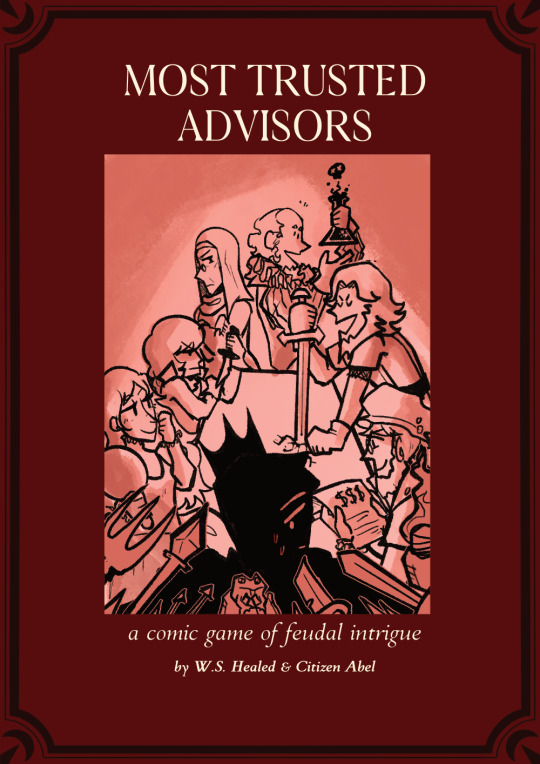
In Most Trusted Advisors, you’ll play as a profoundly incompetent monarch’s eponymous privy council. As lords and ladies of the realm, you’ll be tasked with keeping your liege safe from foreign agents, court conspiracies, and their most dangerous enemy: their own incompetence.
One player will take the role of your liege, responsible for telling you about the disasters your characters must deal with as well as the Misfortunes that befall them when they fail. The rest of you will pick up one of six playbooks and play scheming, petty, self-interested nobles. You’ll try desperately to keep your liege alive, stay in their good graces, and keep the story unpredictable by introducing Twists.
Together, you’ll tell a story of self-interested aristocrats getting themselves into trouble by being selfish, malevolent, incompetent, or all of the above. Play to find out if your lords and ladies can keep their liege in good health and their heads on their bodies, or if they’ll be crushed under the weight of their own schemes.
#ttrpg#tabletop rpg#poll#poll time#indie ttrpg#2020s#indie rpg#most trusted advisors#forged in the dark#fitd
202 notes
·
View notes
Text
the more i dm vs play other ttrpgs the more frustrated i get with how npcs work in 5e. my game centers around a small town with a recurring cast of npcs, as well as newly introduced npcs each arc that my players frequently adopt, and every time i open my Documents (tone: weary) filled with npcs i just wish 5e npcs were Built Different(tm) to pcs. obviously theres statblocks and stuff you can use but if youre working under the assumption these npcs are Full People who are going to take up space in the pcs lives youre going to be building them like you would a pc and frankly it sucks for a couple reasons
one, if i want to introduce a new batch of npcs of a level that will prove imposing for my pcs to fight, it shouldnt take me 10 hours to make them. two, once the fight is happening it would be great if they didnt have so many abilities and spells that im just hoping and praying i can make them function even a little smartly without grinding the whole fight to a halt every time its a spellcasters turn
and third, which i think deserves its own paragraph(s), i wish npcs didnt have the same set of skills that pcs get
i like trying to give my guys, pcs or npcs alike, pretty high mods on things, bc, you know, good for the game and also big numbers fun. but some skills are either inherently useless for an npc to have, or imply a loss of player agency if i was rolling them
like, charisma skills. deception is really useful for an npc to have, because then pcs have to roll insight against it to learn information. persuasion, however, is not something an npc should really ever roll. if theyre rolling persuasion on a pc, that player is experiencing a loss of agency over how their pc reacts to a request. if theyre rolling it on another npc, youre now just playing dollies with yourself while the pcs watch. if im ever choosing between persuasion and deception for an npc, im always going to give them proficiency in deception even if that makes less sense for their character. same problem for intimidation. either youre telling the pcs how to feel or playing dollies with yourself
stealth and sleight of hand are overall way more helpful for npcs than for pcs who arent rogues. and perception is far more useful for an npc to have than like ... survival. when are your npcs going to be rolling survival? if you have a ranger or ranger-like character whos helping your pcs navigate wilderness then why does it make more sense for them to be rolling survival and potentially mess up something they are meant to be good at, causing potentially unfun complications for your party, than just ... knowing that character can help them navigate, so they do? especially if thats the reason that npc is there?
idk like my players respond very well to the npcs being Full People and i do think theres a level of enjoyment to like. comparing pc and npc stats or players learning what feats an npc took or lore around subclasses but also. also im so miserly and decrepit and my google doc of my four bad guys this arc and their spells is 59 pages long im Tired Save Me
#dnd#dnd 5e#i love playing dnd. and i love the game that i run. i dont love running dnd.#its simply not a good system to run for so many reasons#i feel like i run a good game from like. years of original storytelling and improv experience and a large amount of homebrew#and absolutely nothing about the system itself. very frequently fighting the system itself#(before anyone says just switch this game has been going for years and is very entrenched in the fact that its dnd)#(both in characters and also the world and lore)#(but good lord will i not be running dnd again when this game eventually ends)#(getting my grubby little hands on something pbta or fitd maybe)#if any of my players see this i am only filled with immense love for our game but i tried to look up something on cavs sheet earlier#and felt my old man soul withering a bit so#This Post.
106 notes
·
View notes
Text
Nami: THAT'S IT! LIFE IS A LIE! LOVE IS USELESS! EVERYTHING IS MESNINGLESS!
Zoro, casually: Did the afternoon Snail get your horoscope wrong again?
Nami, sobbing: It said today was gonna be awful, but its been really nice ToT
Zoro: what a nightmare.
#source: me#i just like the idea that nami would read those teen maganinses with quizes and horoscopes aimed at teen girls#fitd her vibe#one piece#funny#incorrect quotes#incorrect one piece quotes#one piece incorrect#nami#cat burglar nami#straw hats#one piece strawhats#straw hat luffy#strawhat pirates#zoro#roronoa zoro#pirate hunter zoro#zolo#yup#incorrect qoutes#haha#lol
66 notes
·
View notes
Text
Fire in the Spires Now on Kickstarter
The People's Revolution has been stolen! The Revolutionary Council of Kyneburgh is corrupt! Was it the influence of those dead nobles, the allure of treasures and wealth, or dark and vile magics? Whatever the cause the people starve and riot, and the rich hide in their towers and send their bailiffs to beat us.
We must climb to the top of the city and root out the evil once more! We must burn down their spires!
Fire in the Spires is a single player dungeon climber ttrpg. It's my follow-up/sequel to A Torch in the Dark. It's a story of how revolutions are stolen, twisted, and spit back in the face of those who need them.
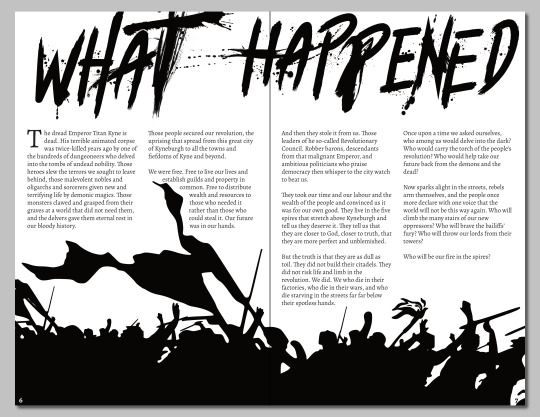
A Torch in the Dark is one of my first games, and to this day one of my most popular. I've never done a sequel before, but I've had this idea for a while now, and wanted to give folks who loved Torch more lore, more ways to play, and more gruesome and wretched rich people to kill.
Fire in the Spires uses the Forged in the Dark rules system, splitting game play into two phases: climbs and downtime. In climbs you assemble a crew of rebels each with a single unique trait. You combine these traits together with spire modifiers and encounter complications to build a die pool, which determines if your crew will ascend, or be weighed down by stress and damage.
When your climb is done, you return to the streets, cross days of the new People's Calendar, and do your best to recover and recruit before your next climb.
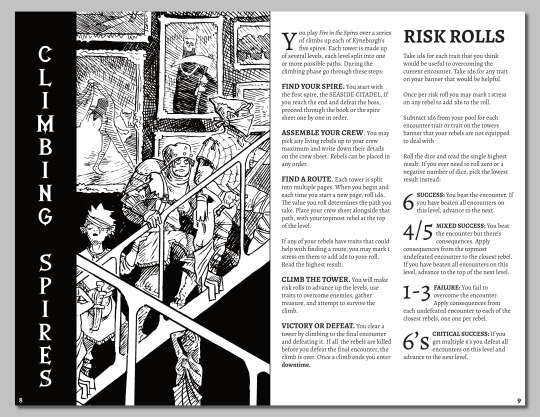

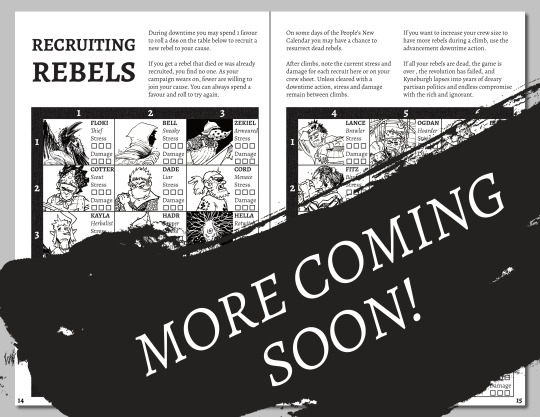
Fire in the Spires is a standalone sequel. You don't need to have read or played Torch to get it. But if you'd rather take your favourite delver through five new dungeons and hundreds of new encounters, you can. I'll be including instructions about how to mash the two games together, if you want to treat Fire in the Spires as more like an expansion.
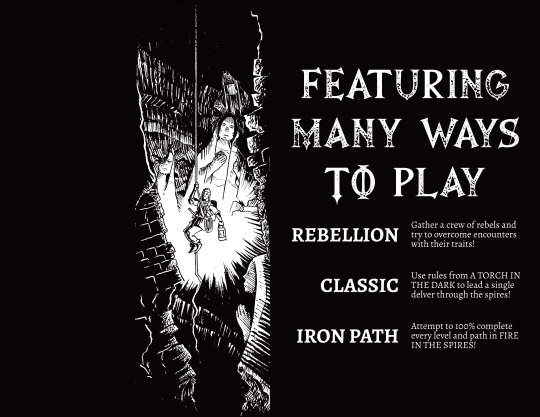
Also, if you missed your chance to get a printed copy of A Torch in the Dark, I'm doing a rare second printing. You can get digital copies as an add-on, or back at certain tiers to get the physical copy.
Check it out on Kickstarter now. Spread the word. Tell your allies. Scream it at your enemies.
Once we asked people to be a torch in the dark. Now, when Kyneburgh needs you again, will you be our fire in the spires?
#indie ttrpg#ttrpg#rpg#solo ttrpg#tabletop#dungeons and dragons#singleplayerttrpg#singleplayer#ttrpgs#rpgs#fantasy#forged in the dark#fitd#a torch in the dark#fire in the spires
46 notes
·
View notes
Text
DARKDATA, A Surreal-ish Horror TTRPG!
(Already made a post like this, but it got eaten. Hopefully that doesn't happen again.)
Hi! I'm currently working on my horror Forged In the Dark game DARKDATA! I'm the only person working in it, and all the "art" you see related to it is made by me, including the logo and character sheets!
It's still the demo phase and being worked on every day. It would mean a lot to me if you could take a look, if you think it's something you would be interested in.
I plan to post more here on Tumblr as I work. I'll only really post on Itch.io to update the game.
Thanks for reading.
63 notes
·
View notes
Text
Character Spreadsheets

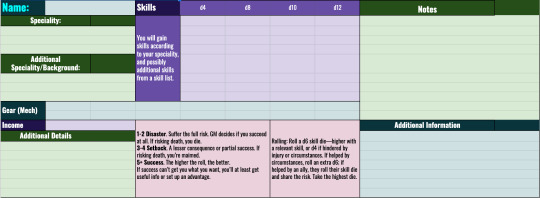
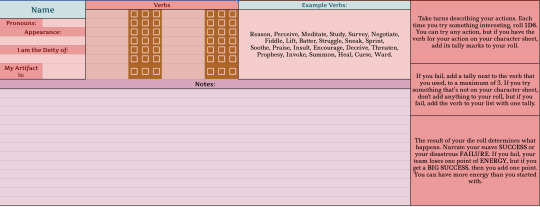
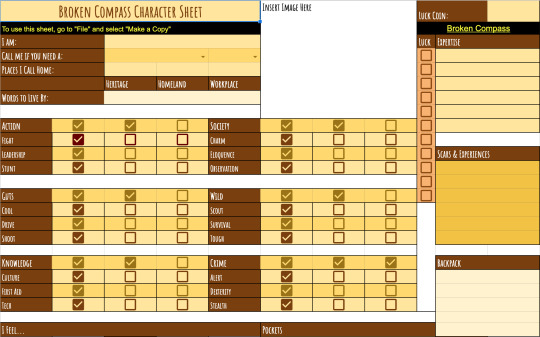

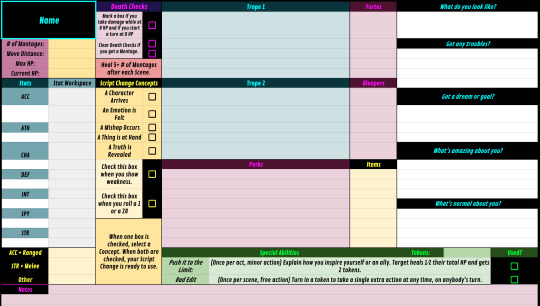

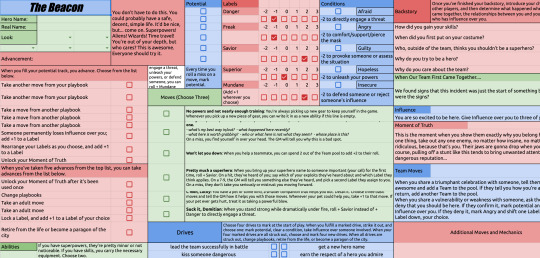

Hello!
For folks who don't know me, my name is Mint, and when I'm not recommending ttrpgs, I like to design play-kits for different ttrpg games to facilitate easier online play. These player kits are designed to be shared with a playgroup in which everyone has editing access, with either character templates that can be duplicated, or a list of playbooks for games that use those instead. I've finally collected all of my useable play-kits into one folder, which I am sharing below for anyone to use. If you would like to use one of these, open up the file. Then select "File" -> "Make a Copy". I have included a tab on many of these games that is labelled "Lines, Veils & Lures." This is a modified version of Lines & Veils that my table uses that incorporates Lures, which are things that the group wants to see in game.
Most sheets also include a link to where you can get the game they are made for, up in the top row of the sheet. So if you see a play-sheet you like, you can find the game pretty easily from there! I've done sheets for big games like Numenera, and little games like Cryptid TV. I'm always working on more, so there will be more that are added to this folder over time. I'll probably also be editing these sheets themselves as I update sections, add links, and incorporate more Lines, Veils & Lures! You can check out the sheets here!
#spreadsheets#ttrpg resources#character sheets#blades in the dark#numenera#thirsty sword lesbians#world of darkness#pbta#fitd#game resources#dnd
750 notes
·
View notes
Note
Hello-hello! TTRPG trick or treat, please! 🎃👻
hi! have a delicious treat:

Brinkwood is a fantastic spin on the formula that Blades in the Dark set out with a very fun theme.
The spin: every character can swap playbooks as they go along by literally sharing a set of "Masks" that confer the power of a playbook to the wearer. In this way, advancement and levelling up is communal.
The theme: the world is ruled by the rich who drink the blood taxes of the peasants to gain immortality, and you play as a group of brigands who have made a pact with an ancient fae being who grants you the power to fight back.
49 notes
·
View notes
Text
We're So Fucking Back. New Beam Saber Playbook Just Dropped
After a pretty long hiatus I'm back to working on Beam Saber supplements. Die Hausmeister is a playbook about turning your Beam Saber mech into a self sustaining mobile home. Kinda like if Thisbe from Friends at the Table and Senshi from Dungeon Meshi were hanging out in Howl's Moving Castle fucking up the Beam Saber downtime action economy.
#beam saber#ttrpg#my ttrpg#beam saber supply drop#thisbe#friends at the table#senshi#rpglatam#fitd#forged in the dark
64 notes
·
View notes
Text
End of the year WINTER SALE!
Need a last minute gift for the TTRPG appreciator in your life? Want to try out a weird new game? Love the joy and thrill of purchasing and downloading a PDF?
Well then I have you covered, because from now until January 5th, 2024, a bunch of my stuff is on sale!


Wow! Just look at those fancy graphics.
I'll be adding to this post to highlight what's what over the next several days but in case you wanted an idea of what you can get; games range from posthuman megastructure dystopia dungeon delves, liminal backroom crawls, action-fashion adventure, magical grad school hijinks, and supernatural mystery building.
Truly, the perfect seasonal offerings!
Anyways, link below (and also above);
Happy Holidays and New Year!
92 notes
·
View notes
Text
When people talk about Blades in the Dark they usually bring up a few big headline mechanics (flashbacks, clocks, load, position/effect etc) and they should because they are really good mechanics. But there are a lot of little things in blades that I think are really important for creating the whole experience and in some cases not all though) are unusual in ttrpgs. SO I thought I'd list some them.
You can't leave:
The 'standard' (but not universal) mode for ttrpgs is 'the adventure' where you travel from place to place seeing new stuff, meeting different people, looting new ruins, solving new problems etc. There might be a hub that you often return to but generally roving about is a core element. And its obvious why this is appealing! But it has two downsides: 1) the players can very easily run away from the consequences of their actions and 2) and the players are constantly being faced with new stuff that they don't really have the hooks to latch onto yet.
In contrast Doskvol is a pressure cooker. Want to leave? Tough! the whole world out there is dead and will kill you. Everything you do will create more characters and plot hooks and conflicts all ready to be pulled into the narrative at any point. If you piss off another faction you can't just skip town, you have to face up to the consequences of your actions. And as you play the players will become more and more immersed in the city and develop a deep understanding of what it going on there.
2. You're a gang of criminals:
A common (again, not universal) base assumption of many games is that you are good guys doing fundamentally heroic things. And this tends to encourage a somewhat reactionary style of play where you are presented with a bad thing that is happening and then attempt to resolve it. In contrast being criminals is a much more proactive endeavor. There isn't a clear threat that needs to be overcome. There's just a situation and its up to you to get what you want out of it.
The scope of play available when you are playing as scoundrels rather than heros is also so much wider. Note you aren't evil, which is equally restrictive. You will do good things and bad things, and struggle so much more with the question of when you can afford to be good and just how bad you are willing to be. You don't just always step up to save the world but instead pursue the things that actually matter to your character, because being a criminal allows your character to be selfish in a way a hero can't be and that massively helps in creating a player driven game.
But you aren't just criminals, you're a gang of criminals, with shared goals and resources and a character sheet to go with it. This really forges a group identity that transcends what is possible in the traditional party (which is essentially just a group of individuals who happen to be in the same place). The crew gives everyone at the table a clear basic goal: build your crew; expand your crime empire. And this is a fundamentally player driven goal! Normally systems reserve this sort of 'domain level' play for high level characters (ie the ones most people never play) but blades puts you there right from the off.
3. Experience:
At the end of each session you go round the table and discuss instances of when each player 'addressed a challenge with [core activities of their playbook]', 'expressed their beliefs, drives, heritage, or background', or 'You struggled with issues from their vice or traumas during the session'. This is incredibly lightweight but also very effective.
Firstly it means everyone at the table is always going to be thinking about and making space for expression of their character and creating problems which is something that can easily be sidelined in favor of optimally addressing the challenges you are facing when there isn't this codified incentive.
And secondly the fact that it is at the end of the session creates this great debrief situation where you go over the highlights of the session and maybe dig a little deeper into why your character acted in the ways they did, which just brings the whole table into having a deeper understanding of each others characters. Again, notice 'drives' as a potential XP trigger. The game rewards (and therefore encourages) motivated characters.
In addition of personal XP you also have crew XP with a similar set of triggers (goals and drives come up again), which really supports building a crew identity, encouraging the crew to be proactive, and centering it as 'the main character' of the game.
4. Rivals:
The concept of rivals only gets a few words in the Blades rules. It appears on each playbook with a list of potential rivals (Just a name and a couple of words of description each) and then again it appears on when you are setting up a scenario in a sentence saying 'Are any enemies or rivals interfering in the operation?' That's barely enough to call it a mechanic. But its incredibly effective! You automatically get a small cast of revolving antagonists, each with some personal connection to a player character, who just keep popping up and causing problems. And 'oh shit, not this guy again! I hate this guy!' is a really great way to tie things together and get players invested in what's going on.
5. Just enough world building:
Blades gives you quite a lot of material to work with on the world of Doskvol. Certainly enough to build out the broad picture. But it is also absolutely chock full of (deliberate) gaps. What this leaves is for you to fill in the gaps to create your version of Doskvol (And it can be quite fun to compare notes with other groups playing blades). The book tells you there is a conspiracy in a faction but it won't tell you who's behind it. The book tells you people are gathering ancient artifacts, but it won't tell you where they come from or what exactly they do. And this means that you can easily set the answer to be whatever would be appropriate for your game. Or even discover the answer through playing!
The book being full of prompts but largely devoid of answers is a very useful tool for the somewhat free form, improvisational style of the game because there will always be things to inspire you but you never need to worry and pausing the game to check what the official stance on something is.
-----------------------------------------------------------------------------------
In general I think the sort of thing I have been talking about is something blades excels at: really lightweight elements that end up having significant impact. A final example of that is the trauma system, which is essentially two sentences long:
If you get too much stress you get a trauma ( one of: cold, haunted, obsessed, paranoid, reckless, soft, unstable, viscous). If you struggled with issues from your trauma this session, gain an xp.
And from that very simple mechanic flows characterisation, character development, and the players deliberately creating more problems for themselves!
Anyway, that's what comes to mind at the moment. I'll add more stuff if I think of it.
You should play Blades in the Dark, its very good.
1K notes
·
View notes
Text
capes in the dark: aftermath i

capes in the dark is my favorite forged in the dark game, period. this is some art of my girlfriend's character, Ace II Arcana! why is she in black and white - magic, actually!!!
#capes in the dark#citd#ttrpg#ttrpg art#indie ttrpg#ace ii arcana#capes in the west march#my art#forged in the dark#fitd
34 notes
·
View notes